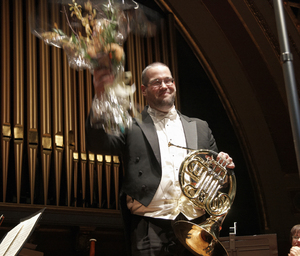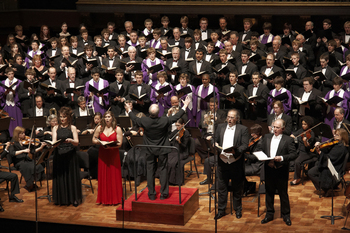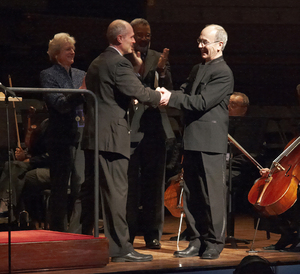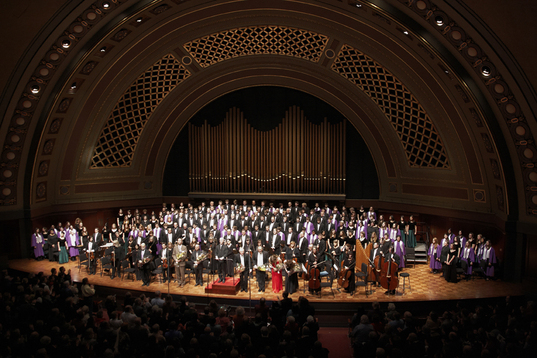Ann Arbor Symphony pulls out all the stops for Mozart Birthday Bash
The magic that is Mozart was definitely in the air Saturday night at Hill Auditorium.
The Ann Arbor Symphony Orchestra offered its 14th annual Mozart Birthday Bash with an all-Mozart program capped by a stunning performance of the composer’s Requiem, his final work, with the symphony augmented by a 200-voice mixed choir and four flawless soloists.
Clearly, there’s no such thing as halfway measures for this ensemble.

A2SO horn principal Andrew Pelletier.
courtesy of the Ann Arbor Symphony Orchestra
Watch an interview with Andrew Pelletier:
The Requiem, the centerpiece of the evening, featured what seemed like a cast of thousands — vocal ensembles from Pioneer, Huron and South Lyon high schools, with singers from Measure for Measure, the Choral Union, the Vocal Arts Ensemble and Temple Beth Emeth, plus soprano Jennifer Larson, alto Sarah Nisbett, tenor John Charles Pierce and bass Stephen West as soloists. Not only did everyone look great up on stage, they sounded even better. The sheer ambitiousness of the project was admirable, and the task of getting members of all these groups to coalesce into a musical whole must have been formidable. By their sound, they were clearly well-rehearsed.

The A2SO and soloists perform Mozart's Requiem.
courtesy of the Ann Arbor Symphony Orchestra
Appropriately, 16 chords into the “Lacrimosa” section of Requiem, conductor Arie Lipsky stopped the show to point out that those were the final notes written by the composer before his death, then restarted the music from the beginning of the movement. The mood was such that I found myself holding my breath.
With such a large group on stage it might have been easy to overlook the musicians; however, the symphony was never overwhelmed, nor did its members seem daunted by their task. Their playing was of the quality we have some to expect from the A2SO under Lipsky’s leadership; that is, a performance of which everyone can be proud.

Mayor John Hieftje congratulates Arie Lipsky.
courtesy of the Ann Arbor Symphony Orchestra
One final note: If you are reading this before 4 p.m. Sunday, there’s Mozart for the whole family at the Michigan Theater. As part of the Symphony’s Family Concert Series, the group presents the “Mozart World Tour: Ann Arbor,” an A2SO-commissioned, one-hour play written by Ann Arborite Jeff Duncan in which actors tell a story while the ensemble plays some of Mozart’s greatest pieces.
When it comes to birthdays such as Mr. Mozart’s, there’s no such thing as too much music.

The Ann Arbor Symphony Orchestra in Hill Auditorium.
courtesy of the Ann Arbor Symphony Orchestra
Roger LeLievre is a freelance writer who covers music for AnnArbor.com.


Comments
musiclover9
Sun, Jan 24, 2010 : 5:53 p.m.
After reading this review, I'm left to wonder if LeLievre and I attended the same performance. Horn soloist Andrew Pelletier's sense pitch was excellent throughout the entire concerto. As others have already mentioned, Pelletier's rendering of the piece was emotionally satisfying, creating a fusion of technical mastery and superb pathos. There was not a boring or unartfully rendered note in the entire piece. I wish the same could be said for the soloists in the Requiem. While there were well done moments, I found the tenor's tendency to blast passages as if he was singing Wagner to be extremely inappropriate. It did not fit the style of the music and left me feeling discomfited and dissatisfied. Furthermore, stopping sixteen bars into the Lacrymosa for a 'chat' that is (at best) musicological conjecture briefly ruined the atmosphere of the Requiem. That is what program notes and brief introductions BEFORE works of great music are for. Going back to then restart the Lacrymosa effectively divorced it from the preceding movement and damaged the progression of the music.
mozartfan
Sun, Jan 24, 2010 : 5:29 p.m.
I heartily disagree with this reviewer. The only problem he apparently found with this concert was that the technically masterful Andrew Pelletier was FLAT? I was in the audience, and his solos were the only inspiring music I heard all night. The pitch was accurate, but above and beyond that, he gave each phrase direction and meaning, as if the notes were words being declaimed in conversation. The vocal soloists often failed to deliver in this respect, which should be the domain of the singing artist. The tenor's voice was totally inappropriate for this repertoire. He should stick to heavier roles, or at least sing Mozart with less scooping and covering. The soprano and mezzo were quite good. The bass-baritone was singing wrong notes on the descending intervals in the Tuba Mirum. This is the most important moment in the piece for him, and he dropped the ball for the trombone player who was beautifully duetting with him. While the bass's voice was overall pleasing in tone, he and the tenor were often behind the beat. If it is your job to sit in judgement about the work of artists in a forum that can affect their careers, at least be more specific and accurate.
cornotoot
Sun, Jan 24, 2010 : 4:04 p.m.
I'm sad that this is what was written about this concert. In all of my years of training as a musician flat has been used to indicate two things: 1. pitch, 2. musical ideas. With pitch, by far Andy was spot on in ALL of the movements of this work and I was quite disturbed at the pitch of the Requiem. Speaking of musical ideas I have listened to many many professional recordings of the 3rd concerto as well as performed it. I have to say hands down this was the BEST interpretation of this work I've ever heard. His musical ideas spoke louder than anything else that night. So if the author could elaborate on what they meant by 'flat' that would be beneficial.
operabethie
Sun, Jan 24, 2010 : 11:04 a.m.
Andy Pelletier was by NO means "flat" in the first movement. Which concert were you at? He is one of the finest players in the country. Do your homework.
VelhoSorriso
Sun, Jan 24, 2010 : 9:55 a.m.
Congratulations on your 10th Anniversary, Conductor Lipsky! We are so lucky to have you in our midst. An admirable decision by Prof Philbert and the Board to pursue excellence. And congratulations to the soloists and all those involved in the Requiem ~ lux perpetua luceat eis (let perpetual light shine upon them)!